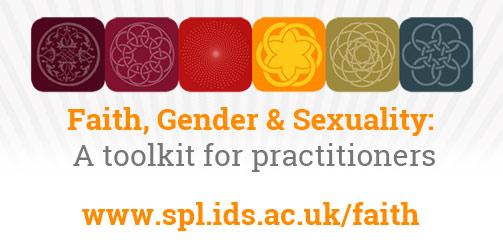Originally published on IDS’s website on 11/04/2016. Available at: https://www.ids.ac.uk/news/new-interactive-resource-to-bridge-gap-between-faith-gender-and-sexuality/
Across the globe, religion plays a critical role in shaping attitudes about gender norms and sexuality, which in turn have a profound effect on people’s everyday lives. A new Faith, Gender & Sexuality Toolkit launched today seeks to build knowledge and provide crucial support for faith communities and leaders working to promote social justice in relation to gender and sexuality.

Developed by the Institute of Development Studies (IDS), Sonke Gender Justice and the Wits Centre for Diversity Studies (WICDS) together with communities and leaders from a range of faiths, the free interactive Toolkit debunks dangerous myths and encourages exploration and reflection on different ways to think about sexuality and gender diversity.
Crucially, the Toolkit highlights how faith leaders and communities can be effective allies in advancing human rights. It demonstrates how some religious and cultural practices enhance human life and how some are misused to deny rights, and that culture and tradition are not static but open to re-interpretation, reinvention and re-imagining.
“Increasing knowledge about the links between sexuality, gender and faith is a vital step in tackling the social injustices that affect millions of people globally, and faith leaders have a critical role to play in influencing attitudes, culture and policy. We hope the Toolkit supports faith leaders and communities doing vital work to promote the wellbeing of gender and sexuality minorities. As a collectively created resource, we invite your feedback. Our aim is for the Toolkit to be agile, evolving into a collectively owned resource with global reach” said IDS’s Elizabeth Mills who led the development of the Toolkit.
Comprised of six modules and drawing from faith-based case studies, the Toolkit helps to broaden understandings of key issues such as gender-based violence; sexual diversity; sexual and reproductive health rights; and women, gender and power. Designed for use with all faith-based groups, including those of mixed faith, the Toolkit provides useful information and practical exercises that can be used to promote human rights and gender equality from the perspective of faith, and includes a wide range of further resources and information produced by leading research and faith-based organisations.
Understanding linkages between gender and sexuality is crucial for addressing inequality
Marginalisation and discrimination are too frequently used to ‘punish’ people who do not conform to social norms around gender and sexuality. The Toolkit explores how marginalisation is fuelled by social norms, limiting women’s access to leadership positions or to sexual and reproductive health services, for example. It also offers resources, including practical activities, that can be used by faith leaders and communities to discuss complex topics in an open and constructive way, encouraging dialogue as a means to promote respect and equality for people of all genders and sexualities.
Sexual diversity: a human right that affects everyone
IDS research has shown that having a sexual orientation or gender identity that does not conform to the majority norm can affect one’s ability to earn a livelihood and gain employment, access education and healthcare, form the family and personal relationships that you desire, live free from violence and harassment, and seek justice through the law.
Sexual rights embrace human rights that are already recognised in national laws, international human rights documents and other consensus documents. Like heterosexual people, lesbian, gay, bisexual and trans people are entitled to the same rights as those of other human beings.
Generating inclusive strategies to address inequality for all population groups, including people who identify as queer, gay, lesbian, bisexual and transgender, is not only about taking human rights seriously, but very much about recognising that this has positive social and economic outcomes for countries that take poverty alleviation seriously for everyone.
Interactive and growing resource
The Toolkit documents the learning from the IDS Sexuality, Poverty and Law Programme. Suggestions are welcome for examples, information and resources to include. These will be updated on a regular basis to provide a growing resource centre for faith leaders, activists and practitioners.
- Access the Faith, Gender and Sexuality Toolkit
- To send in suggestions for content or to comment on the Toolkit please email: spl@ids.ac.uk
- To subscribe to e-newsletter updates on IDS work on sexuality, poverty and law, contact spl@ids.ac.uk
- Follow us on Twitter #faithgendersex for more discussion around the Toolkit
